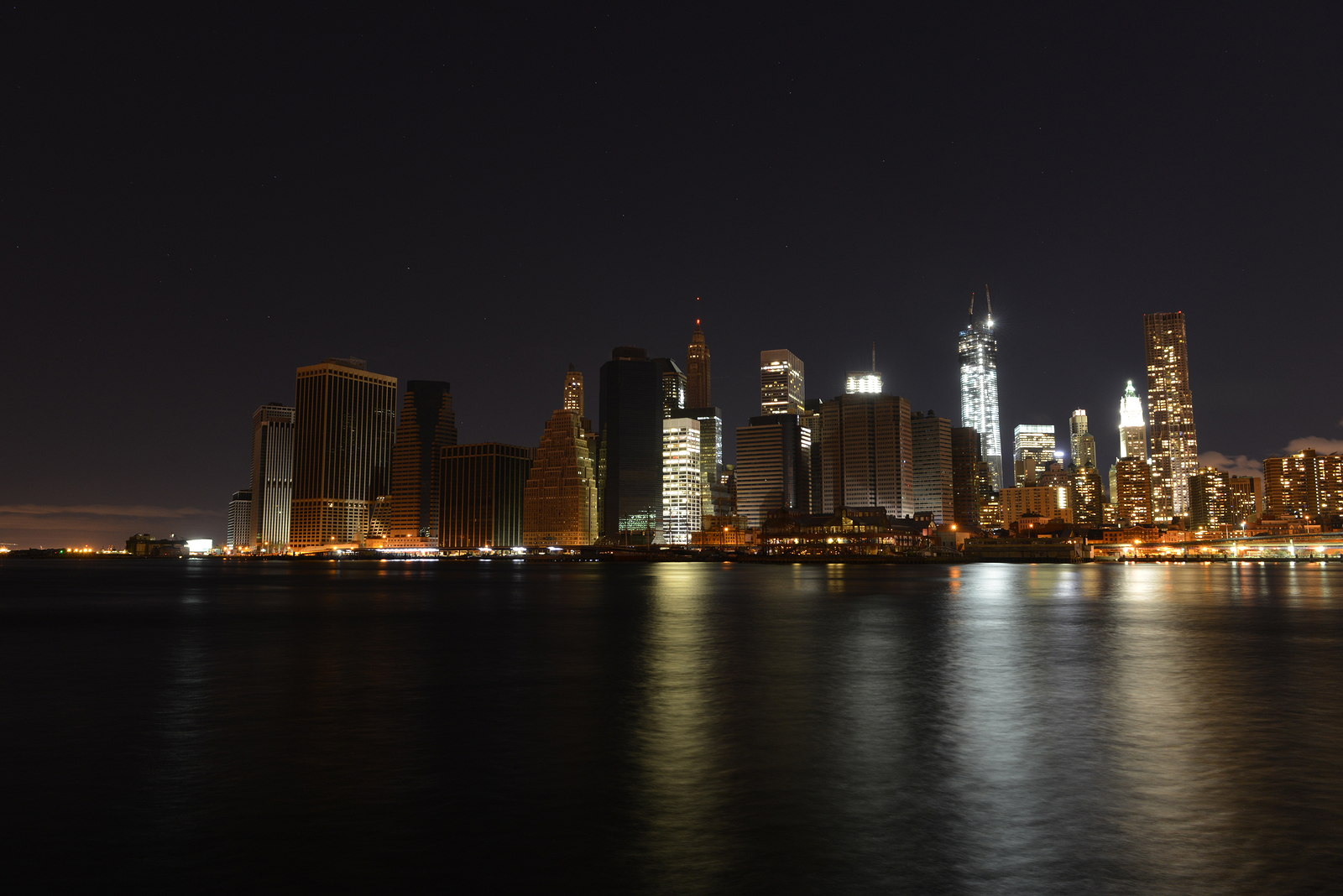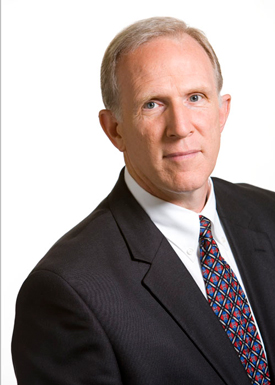Republican Climate Hearing Agenda
Air Date: Week of September 6, 2013

Hurricane Sandy knocked out power in most of lower Manhattan, bringing the reality of climate change home for people in the Northeast. But many Republicans don’t see climate change as an urgent problem. (photo: bigstockphoto.com)
The House of Representatives is gridlocked on climate change, with Republicans skeptical of the science. The Heritage Foundation's climate, energy and economics analyst David Kreutzer tells host Steve Curwood that despite their decision to hold hearings, Republicans aren’t changing their position on climate, and question government spending .
Transcript
CURWOOD: Well, it's hardly a surprise, given the highly partisan nature of US politics at the moment, that Republicans have a different take on these climate hearings. David Kreutzer is the research fellow in energy, economics and climate change at the Heritage Foundation, a conservative think-tank, and we called him up to ask what he thought had prompted House Republicans to call for hearings at this time.
KREUTZER: I think what they're seeing is a regulatory push to enact climate legislation as it were, or to push climate legislation, and they are worried that the science used to support some of these regulations isn’t up to snuff, and I think they would like to check into that.
CURWOOD: Now Congress hasn’t been able to pass legislation on this. What do you think of the President’s regulatory framework on climate?
KREUTZER: Well, his regulatory framework seems to be pretty much a war on coal, and if you look at the regulations, that’s pretty much what we’re getting. They’re going after coal in a variety of different ways, and pretty much no one’s building new coal plants now.
CURWOOD: David, you write a fair amount about environmental economics. Tell us what addressing climate change would mean for our economy.
KREUTZER: Well, it depends how you address it and to what level. We’re having climate change. We know that we’ve been having it for millions of years. Temperatures go up, temperatures go down, sea levels go up and down.
So I think what you want to do is say, well what do we get for the money that we spend on the different approaches to adapting or preventing climate problems? If you simply try to do it all through restricting carbon dioxide, it gets very expensive, and you don’t really get much bang for the buck. And if we were to have fully enacted, the Waxman-Markey cap and trade bill, the best high end estimate of our likely impact on world temperatures 100 years from now is about two-tenths of a degree.

David Kreutzer (photo: Heritage Foundation)
CURWOOD: What do you think is the motivation of the people who are advancing what you think are inappropriate models of climate performance?
KREUTZER: Well, if they do say there’s an amazing problem coming down then you’re more likely to hear them than if you say there’s not much of a problem. You’re going to get more money to investigate catastrophes than you are to investigate if there’s nothing much happening.
CURWOOD: So this is the Chicken Little school of getting budgets, you say?
KREUTZER: Ah, that’s a pretty good description.
CURWOOD: Now the House Committee that’s having these hearings...up until now they had refused to hold any hearings on climate change. David, what do you think this might signal in terms of a shift in their perspective on the science of climate change?
KREUTZER: Well, I think they are more confident in the science supporting the positions they’ve held, and it’s not the mindless – ‘there’s no warming, C02’s not a greenhouse gas’ - I don’t know any skeptics, serious ones, that hold that position. The question is how much warming are we having? Are we heading toward a catastrophe? It seems to be very clear we’re not, and to what extent can you moderate that temperature increase and what does it cost, or are there other approaches, other better ways, to spend money to protect ourselves from hurricane damage and tornado damage and to promote economic growth?
CURWOOD: Now, as I understand, the proposed witness list includes representatives from every major agency to talk about the climate change programs and the budgets associated with that. Some cynics have suggested that perhaps the House is looking for an opportunity to further cut agency action on climate change from the federal budget.
KREUTZER: Well, I think they would want to look and see what benefit you’re getting from it, and if you’re not getting much benefit and it’s costing a lot then maybe they would want to cut it. I mean, that’s pretty generic. You want to spend your money effectively, and just calling something a climate policy doesn’t mean actually it is one, doesn’t mean it’s an effective one, and it doesn’t mean it’s affordable.
CURWOOD: Now the Intergovernmental Panel on Climate Change will shortly have its latest report out which gives it 95 percent confidence that humans are having an effect. And the numbers they have show that we may well be headed on the path to catastrophe here. If Congress can’t act, and the President sees warnings that we could be headed into catastrophe, what alternative does he or she have but to use a regulatory process?
KREUTZER: Well, there’s a bait and switch in that argument you just gave. And that is there’s 95 percent confidence that humans are having an impact. I don’t know if it’s 95 percent, let’s say it’s 100 percent. The question is how much impact are they having.
CURWOOD: Well, wait a second...
KREUTZER: That’s where you don’t have this huge consensus that people keeping talking about. Yes, you can get a whole bunch of scientists to agree C02’s a greenhouse gas and we’re emitting C02. You can’t get this 93 or 97 percent or whatever to say that we headed towards seven feet of sea level rise in 100 years or something like that.
CURWOOD: Yes, I would say that the science I’ve been shown involving the IPCC is pretty firm about the range that we’ll get on the two degree [Celsius] rise that international agreements say that we’re trying to limit things to. Let’s say that the scientists who say that we’re headed to catastrophe, there’s a 10 percent chance that they’re right. Is that an appropriate risk for our civilization?
KREUTZER: Um, I don’t think it’s a 10 percent chance that it’s right.
CURWOOD: David Kreutzer is the research fellow in energy, economics and climate change at the Heritage Foundation. David, thanks so much for taking this time with me today.
KREUTZER: Thanks for giving me the chance to give my view.
Links
Living on Earth wants to hear from you!
Living on Earth
62 Calef Highway, Suite 212
Lee, NH 03861
Telephone: 617-287-4121
E-mail: comments@loe.org
Newsletter [Click here]
Donate to Living on Earth!
Living on Earth is an independent media program and relies entirely on contributions from listeners and institutions supporting public service. Please donate now to preserve an independent environmental voice.
NewsletterLiving on Earth offers a weekly delivery of the show's rundown to your mailbox. Sign up for our newsletter today!
 Sailors For The Sea: Be the change you want to sea.
Sailors For The Sea: Be the change you want to sea.
 The Grantham Foundation for the Protection of the Environment: Committed to protecting and improving the health of the global environment.
The Grantham Foundation for the Protection of the Environment: Committed to protecting and improving the health of the global environment.
 Contribute to Living on Earth and receive, as our gift to you, an archival print of one of Mark Seth Lender's extraordinary wildlife photographs. Follow the link to see Mark's current collection of photographs.
Contribute to Living on Earth and receive, as our gift to you, an archival print of one of Mark Seth Lender's extraordinary wildlife photographs. Follow the link to see Mark's current collection of photographs.
 Buy a signed copy of Mark Seth Lender's book Smeagull the Seagull & support Living on Earth
Buy a signed copy of Mark Seth Lender's book Smeagull the Seagull & support Living on Earth

